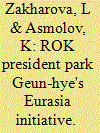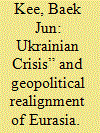| Srl | Item |
| 1 |
ID:
138214


|
|
|
|
|
| Summary/Abstract |
South Korean President Park Geun-hye's Eurasia Initiative, put forward in the fall of 2013, was a declaration of intent to launch a mega-project encompassing not just Southeast Asia but a far greater space. The official title is "Opening and Denuclearization of North Korea through the Peaceful Prosperity of Eurasia." The Eurasia Initiative is an ambitious plan to change the fundamentals of global economy, diplomacy, and national security geography, recreate the history of "one continent," and advance global peace within one economic bloc and market. It is a "creative organization" of the global village, something not a single world leader has ever considered establishing. President Park described her plan for peaceful prosperity in Eurasia as "Resurrection of the Silk Road".
|
|
|
|
|
|
|
|
|
|
|
|
|
|
|
|
| 2 |
ID:
167171


|
|
|
|
|
| Summary/Abstract |
This article examines South Korea’s response to BRI, focusing on former President Park Geun-hye’s “Eurasia Initiative” as well as current President Moon Jae-In’s “New Southern Policy.” Given Beijing’s preoccupation with political and social stability both domestically as well as in neighboring countries, it argues that there is little doubt that for Beijing economic goals are subordinate components of broader national goals, which in turn formulate the basis for geopolitical calculations. BRI represents an attempt by Beijing’s leadership to shape the rules and norms governing the surrounding regions to better reflect their own preferences. Following Xi Jinping’s launch of BRI, Seoul announced the Eurasia Initiative (EAI) as its own vision for an East-West connection. In calling for a revival of the ancient Silk Road, President Park’s main goal was to foster a flow of economic, political, and social interaction from Europe though the Korean Peninsula. Her policy was driven primarily by political and security motives concerning the division of the Peninsula. Park’s successor, President Moon announced his own foreign policy initiative, the New Southern Policy (NSP), which seeks to strengthen relations with Southeast Asia while continuing to manage relations with Northeast Asia. While NSP at first sight might suggest a new policy direction, the article argues that both EAI and NSP ultimately have sought to change dynamics on the Korean Peninsula and work toward peace with the North. Both policies reflect the Korean fear of vulnerability to great power competition, seeking to foster relations with smaller powers so as to increase Seoul’s foreign policy leverage as a middle power.
|
|
|
|
|
|
|
|
|
|
|
|
|
|
|
|
| 3 |
ID:
139779


|
|
|
|
|
| Summary/Abstract |
The Eurasia Initiative advanced by President Park Geun-hye of the Republic of Korea (ROK) in October 2013 has become a major project that South Korea is now promoting on the international scale. The authors of this article survey the major point of the Eurasia Initiative originating in the Republic of Korea and assess its high points from the perspective of Russia's interests in the region. They also take a close look at President Park Geun-hye's approach to relations with North Korea and her Korea unification policy.
|
|
|
|
|
|
|
|
|
|
|
|
|
|
|
|
| 4 |
ID:
142089


|
|
|
|
|
| Summary/Abstract |
This article focuses on the current arguments and geopolitical visions regarding the organizational shifts in Europe and the Eurasian region and the means for realization of these policies. It shows the responses of the major powers in Europe and Eurasia with regard to the “Ukrainian Crisis.” In this article also, analysis and comparison of the Eurasian strategy of China and Russia, which bear critical importance to geopolitical and geoeconomic considerations regarding the Korean Peninsula, is treated with significance along with the aforementioned issues. The article attempts to provide a short analysis of the implications of these pan-Eurasian strategic shifts on the Eurasian initiative of the Korean government. The concepts of Russia’s “Pivot to the East,” China’s “One Belt, One Road (OBOR),” and Korea’s “Eurasia Initiative” share a potential to stimulate the transition of the Asia-Pacific region from “the ocean of conflict” to “the ocean of peace.” However, in realizing these concepts, the relationship between Korea and the four powers (U.S.A./China/Russia/Japan) have a “strategic trilemma.” If the Eurasia Initiative can facilitate construction of the “continent of peace” in Eurasia, it will provide a vision and strategic opportunity to change the region form an “ocean of conflict” into an “ocean of peace.”
|
|
|
|
|
|
|
|
|
|
|
|
|
|
|
|